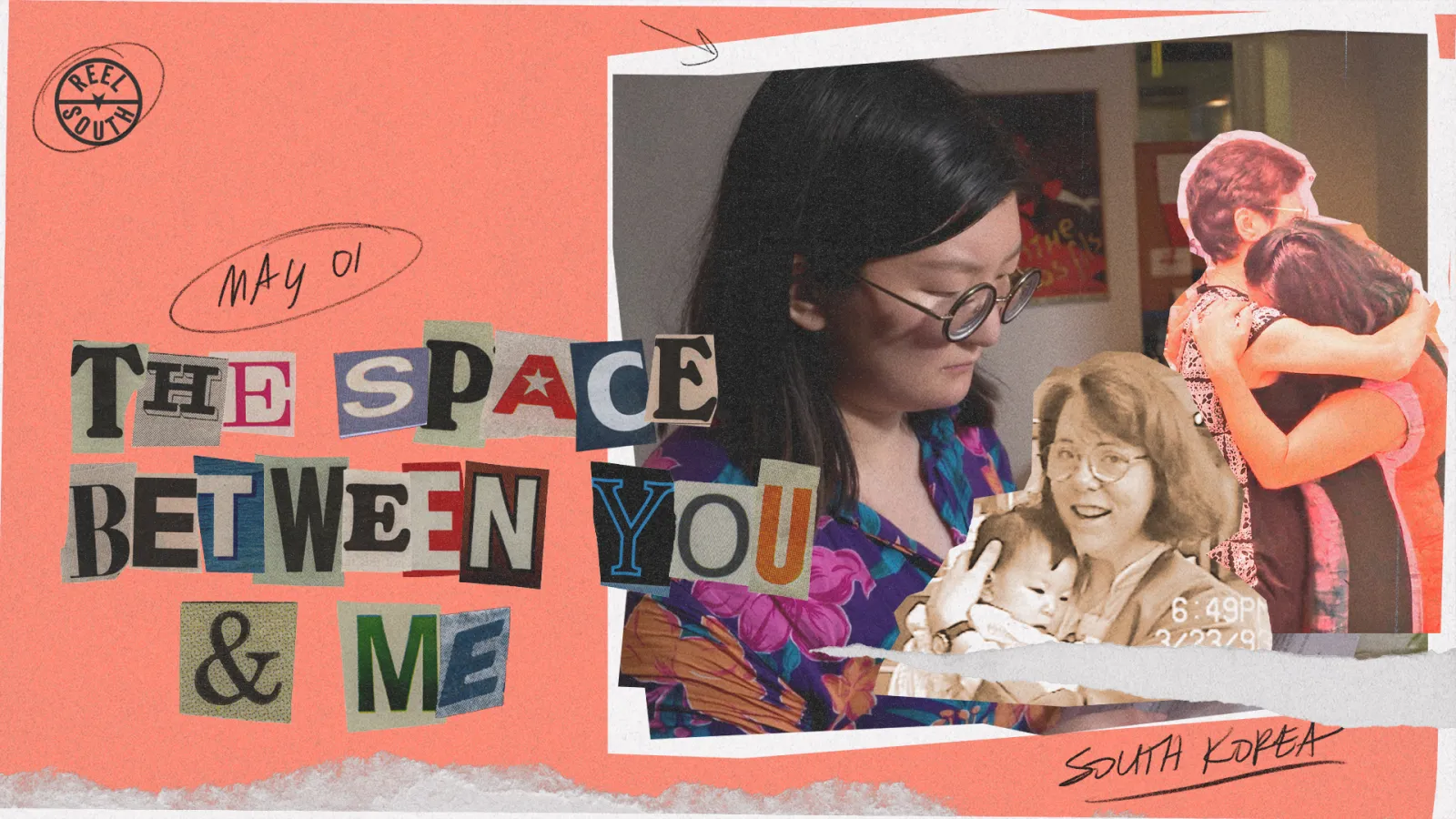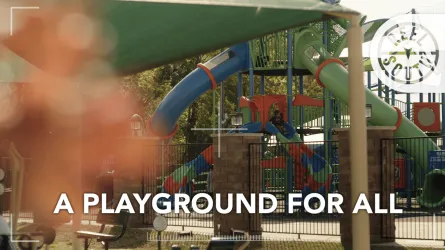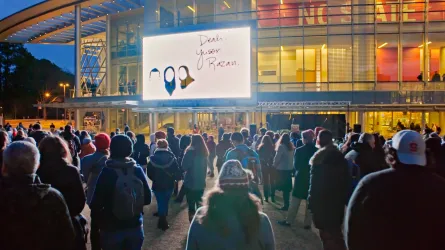Lily Ahree Siegel, a Korean-American filmmaker from Alabama, created "The Space Between You and Me," which explores the complexities of international adoption through the stories of her birth mother and another adoptee in New York. The film is an effort to reclaim a stolen identity while searching for belonging between the worlds of the Jewish South, the Korean-American diaspora, and a fraught legacy of Korean adoption programs.
Before her Reel South premiere, RS digital producer Heather Nunerley spoke with Lily about the creation of the film and the complexities of international adoption. Watch "The Space Between You and Me" on PBS' Reel South.
This interview has been edited for length and clarity.
Heather: After watching your film, what do you hope resonates with the Reel South audience?
Lily: Even though the film is very specific in subject matter, I think there’s a universality of belonging (or not) within the film. I also hope the trauma of adoption is recognized from an adoptee and a birth mom perspective, which is often missing from adoption conversations. Much of those adoption conversations are centered around the parents who are adopting. Adoption is seen as a positive experience, but it’s not. It’s more nuanced and complex than that. It’s about time that adoptees and birth moms reclaim their space and stories, especially when adding the complexity of transnational and transracial adoptions.
Heather: How do you think adoptees and mothers can better "reclaim their space" in the international adoption process?
Lily: I can only reply based on my experience as a Korean adoptee, so I can’t comment on a birth mom’s experience of reclaiming their space per se. I think it’s important for their stories to be shared more, however. I just read “We Were Once A Family,” by Roxanna Asgarian which dives deeper into the injustices and corruption of domestic adoption and CPS in the states from the birth family and adoptee perspective. I think the birth family often is pinned as the antagonist in the adoption triad, which includes the adoptive parents, the adoptee, and the birth family. Many people who have watched the film have viewed my birth mom as an antagonistic character in a sense, like “How could they do that?” But I think it’s a matter of perspective and understanding of Korean culture. We are applying a Western lens to her story which might cloud our understanding of the narrative and their decisions.
For other international adoptees, I think the best way to reclaim your space is to reach out to the adoptee community. There are often meet-ups in big cities, which I am attending in London; there are KBBQ lunches with Korean adoptees but also an Asian adoptee group comprised of mostly Chinese adoptees. There are even tour groups that are adoptee-focused to explore the motherland. The online community is also big and is through Facebook groups, Instagram, and even podcasts. But no one should force anyone to get involved if they’re not interested. Everyone is on a different step in their journey.
Heather: How did the film come about? How did you find your subjects?
Lily: This is a very personal story, close to my heart, so I knew it was something that I wanted to tell. I made this film during my Directing Documentary MA at the National Film and Television School which is outside of London, UK. I wanted to connect with other Korean adoptees who were moms. I don’t have children, so I wanted to know what it was like to have a child as an adoptee. Usually, that baby is the first biological connection to an adoptee they have had. That was the initial idea. I reached out to various Korean adoptee groups, and chatted with many moms which was great fun! Emily reached out to me through one of my posts — her opinions about being adopted were very clear. It was a coincidence that she had also reunited with her birth mom, but that was the fact that turned the film into more of a birth mother and mom-focused story.
Heather: Can you describe the creative process and how you landed on that editing style?
Lily: Jon Crook, editor, and I decided pretty early that the video call between my birth mom and I would serve as the structural narrative. It gave us a solid base to tie together Emily’s interview and self-shot footage.
We were in production and post during late 2021; I could not go to New York to film. I got a friend from university to film Emily’s interview in NYC while I conducted the interview online. I also asked Emily to send video clips from her life as if she was filming a video diary to her Korean mother. Just to share her life as it is. One huge moment was when Emily decided to get her tattoo, which happened during our edit. Jon and I knew we needed to highlight this. I also love that we never show the finished tattoo, only Chloe’s reaction. The tattoo is a bigger symbol overall.
Jon and I also had a lot of help from our tutors, Jo Abel, Sunshine Jackson, and Peter Dale, who gave feedback on narrative structure and voiceover. It was the first time that I wrote and performed voiceover, and it was definitely one of the most challenging bits. Jon still jokes about the temp voiceover!
Heather: Do you have any updates to share about your subjects that you can share with us?
Lily: Emily and I have stayed in touch, and we got to meet in person at her Brooklyn home a few weeks ago! It was very deja vu since I had seen the space through the video diaries. She went back to Korea with her family in the summer of 2022, so that was a very special time for her kids to see Korea as well. Tragically, Emily‘s sibling, also adopted from Korea, who can be seen in the family images, was recently killed by police brutality during a wellness check. Emily has been dealing with that injustice and loss for the past few months. That is a very big burden and definitely needs a bigger conversation.
My birth mom is doing well, and we keep in touch. I have not been to Korea since 2019, but hopefully, I will again soon. I miss her.
Heather: What are you working on next? Anything cool to share?
Lily: I recently produced and directed a short film that was commissioned by Netflix called "My Partner Lives In My Phone." It's a comedy documentary short featuring myself and my partner, Noah, as we try to find a connection in our long-distance relationship through the digital age. You can watch it on Netflix's Youtube (18+):
https://youtu.be/DLPOYVzIMEM.
I am participating in a film fellowship this summer, and also pitching longer-form documentary ideas to Channel 4 in London, UK, where I am currently based.
Heather: Can you tell us your favorite part of the film?
Lily: The film was a team effort, though I have to say I’m particularly proud of the original music, which was composed by Hannah Barnett. Hannah and I worked really hard to bridge difficult emotions that were not singular emotions like happy or sad, but bittersweet and pensive, throughout the film. I really did not want the music to lead the audience’s emotions too much, and I think we collaborated on several amazing music cues that fit really well throughout the film.
Category
Share


